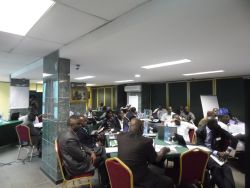Collaboration between National Focal Points of CBD, CMS and CITES in Revising National Biodiversity Strategies and Action Plans
 Yaoundé/Bonn,
Yaoundé/Bonn,
2 July 2013 - A workshop aimed at improving the
capacity of Francophone African National Focal Points in
identifying indicators and integrating CMS and CITES objectives
into National Biodiversity Strategies and Action Plans (NBSAPs),
took place in Douala, Cameroon, from 25-28 June 2013.
This workshop, which brought together National
Focal Points for CBD, CMS and CITES from eight Francophone
African countries (Benin, Burkina Faso, Burundi, Cameroon,
Cote d'Ivoire, Niger, Senegal and Togo) and was made possible
thanks to funding from the United Nations Environment Programme
(UNEP). It was organized by the UNEP Division of Environmental
Law and Conventions, the UNEP Regional Office for Africa
and the UNEP World Conservation Monitoring Centre, in consultation
with the CBD and CMS Secretariats and as an activity of
the Biodiversity Indicators Partnership (BIP). It was kindly
hosted by the Cameroon Ministry of Environment and Nature
Protection.
The workshop made use of various methods
(such as presentations, role plays, group exercises and
open discussions) which contributed to identifying key areas
and possibilities for synergy between CBD, CMS and CITES
in the process of updating and implementing NBSAPs. The
aims were to increase the skills of the National Focal Points
in identifying and developing national objectives, targets
and indicators from the Aichi Targets during the revision
of their NBSAPs, and to share experiences and lessons learnt
from their NBSAP revision processes.
In order to bring all participants to a
comparable level of understanding of the key objectives
and priorities of all three Conventions represented, a series
of presentations was delivered. These covered the Strategic
Plan for Biodiversity 2011-2020 together with the Aichi
Targets and the new concept of the CMS Strategic Plan 2015-2013.
The CMS Strategic Plan is under development and its expected
have a stronger link to the Aichi Targets. An overview of
the synergy between Biodiversity related Multilateral Environmental
Agreements (MEAs) in Africa in the context of the revision
of NBSAPs was also presented.
Presentations of case studies on the revision
of NBSAPs from three of these countries (Cameroon, Cote
d'Ivoire and Niger) as well as exchange of information from
all the countries on the issue of synergy in the process
of revising their NBSAPs revealed some key issues such as:
• There wasconsultation of relevant stakeholders
(including the Focal Points of Biodiversity-related MEAs)
in all these countries at different phases of the process
of revising their NBSAPs. This was however considered
as not sufficient to effectively ensure the incorporation
of relevant objectives of other MEAs into the revised
NBSAPs;
• The countries were at different stages in the
process of revising their NBSAPs, thereby inferring different
degrees of possible interventions in the process to reinforce
synergy towards revising the NBSAPs;
• The need for clear fund raising strategies involving
the different National Focal Points as well as the GEF
Focal Points, in order to assure effective implementation
of the revised NBSAPs.
Through role plays and group exercises,
the participants were also empowered with skills to identify
and formulate SMART objectives, targets and indicators,
and applying these in the process of integrating the Aichi
Targets during the revision of their NBSAPs.
The workshop was a great success and revealed
an overall keenness of the National Focal Points to collaborate
in their efforts towards global biodiversity conservation
and particularly through the revision and implementation
of NBSAPs. It equally provided a forum for sharing of experiences
and lessons learnt from the different countries present,
towards ensuring synergy amongst MEA National Focal Points
during the process of revising their NBSAPs.
A general recommendation was the need for
further guidance at a higher political level for the national
consultation processes, as well as the need to ensure integration
of the objectives of not only CMS and CITES, but of all
other Biodiversity related MEAs (such as the Ramsar Convention
and World Heritage Convention), in the new generation of
NBSAPs. The National Focal Points departed from this workshop
full of enthusiasm to put into practice the additional skills
acquired.
Last updated on 16 June 2014


